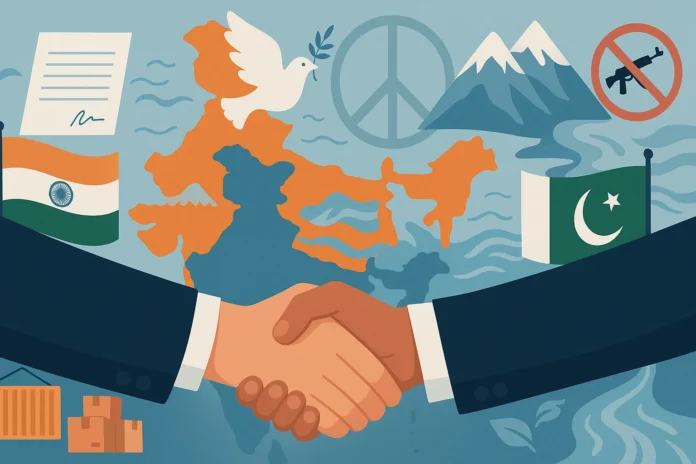Date: May 27, 2025
Author: Latest News Daily Bureau
In a significant diplomatic overture, Pakistan’s Prime Minister Shehbaz Sharif has extended a fresh proposal for comprehensive dialogue with India, signaling hope for the revival of peace in South Asia. The offer aims to address long-standing flashpoints including the Kashmir dispute, cross-border terrorism, bilateral trade, and shared water resources.
This outreach marks one of the most direct calls for engagement from Islamabad in recent years and comes at a time when regional and global tensions are being reshaped by shifting geopolitics.
A Bold Call for Peace in a Tense Region
Ties between India and Pakistan have remained frozen since August 2019, when India revoked Article 370, altering the special status of Jammu and Kashmir. Since then, diplomatic channels have largely remained inactive, with both countries maintaining high-alert military postures along the Line of Control (LoC).
But on Monday, in Islamabad, PM Shehbaz Sharif made headlines by urging both nuclear-armed neighbors to resume talks for “the larger interest of regional peace, economic cooperation, and humanitarian stability.”
“We cannot afford another conflict. Dialogue is the only path forward to resolve the Kashmir issue, combat terrorism jointly, open trade corridors, and share water resources in a fair manner,” said Sharif during a national press address.
His remarks have sparked reactions from both sides of the border, with analysts cautiously welcoming the gesture while noting the road to normalization remains steep.
Breaking Down the 4 Key Issues He Raised
PM Shehbaz Sharif’s outreach focused on four highly sensitive but interconnected topics:
1. Kashmir – The Heart of the Conflict
The most deeply entrenched issue, Kashmir has led to three wars and countless skirmishes between the two nations. While India considers the region its “integral part,” Pakistan continues to advocate for Kashmiri self-determination under UN resolutions.
Sharif emphasized a peaceful, diplomatic resolution, hinting at “third-party facilitation” without directly mentioning international mediation.
Analyst Insight:
Former diplomat Abdul Basit said, “This is a soft nod towards a backchannel route where the groundwork for future talks could be laid, much like the 2003-2007 composite dialogue era.”
2. Terrorism – A Mutual Concern
India has consistently linked cross-border terrorism to any future diplomatic engagement. Since the Pulwama attack in 2019, Delhi has maintained that “terror and talks cannot go hand-in-hand.”
Sharif, however, stressed Pakistan’s internal struggles with homegrown extremism and extended a hand to India to “collaborate on intelligence, de-radicalization, and border security.”
While skepticism remains in New Delhi, this is one of the first times a Pakistani PM has openly acknowledged terrorism as a shared concern, not just an Indian one.
3. Trade – A Potential Game-Changer
Bilateral trade has been minimal since 2019, severely affecting industries on both sides of the border. Pakistan’s current economic challenges—including soaring inflation, an IMF debt restructuring program, and a weakened rupee—make regional trade more important than ever.
Sharif stated,
“Let trade not be a hostage to politics. Let the people of Punjab, Rajasthan, Sindh, and Gujarat thrive together.”
According to trade experts, reopening trade could inject billions into both economies, particularly in sectors like textiles, agriculture, pharmaceuticals, and IT services.
4. Water – The Looming Climate Conflict
Pakistan has long expressed concerns over India’s construction of dams on rivers covered under the Indus Waters Treaty. As climate change accelerates, disputes over water sharing are becoming more intense.
Shehbaz Sharif proposed reviving the Indus Water Commission and establishing a joint water management task force to ensure equitable distribution and mitigate flood risks.
Environmental experts see this as a practical step, urging that water diplomacy be de-linked from broader political disputes.
What’s Next? Real Diplomacy or Political Optics?
While the speech has made international headlines and received cautious praise from regional think tanks and the UN, the big question remains—Will India respond?
As of now, New Delhi has not issued an official statement. However, government sources told media outlets that any potential response would depend on “concrete and verifiable actions” from Pakistan—particularly on curbing terrorist infrastructure operating near the LoC.
Geopolitical Timing
This offer comes ahead of key international summits, including:
- Shanghai Cooperation Organization (SCO)
- UN General Assembly later this year
Experts speculate that Pakistan may be trying to reframe its global image from a security state to a peace-seeking democracy.
Internal Political Context
Sharif’s gesture also coincides with Pakistan’s attempts to stabilize its domestic political landscape. The coalition government has faced criticism for its economic management and shrinking civic space.
Offering peace talks could be a strategic move to divert public discourse and gain international legitimacy.
Global Reactions: A Mixed Yet Watchful Response
United Nations:
UN Secretary-General António Guterres welcomed the call for dialogue, stating, “We support all initiatives that promote peace and reduce the risk of conflict in South Asia.”
United States:
The US State Department maintained a neutral tone, reiterating its long-standing position:
“It is up to India and Pakistan to determine the pace and scope of their dialogue.”
China:
China, a close ally of Pakistan, called the development “positive” and encouraged both sides to maintain open communication channels.
Voices from the People – Hope or Skepticism?
“As a Kashmiri, all I want is peace and dignity. If dialogue can bring that, let’s not waste more time.”
— Aamir, Srinagar
“This feels like déjà vu. We’ve heard this before. Until Pakistan acts on terror, India won’t listen.”
— Pooja, New Delhi
“Trade and water are survival issues. If politics blocks that, everyone loses.”
— Zainab, Lahore
Final Thoughts: Will the Ice Finally Break?
Peace between India and Pakistan has always been elusive—but never impossible. Shehbaz Sharif’s offer is not a magic wand, but it might just be the first serious signal of thaw in a long winter of hostility.
Whether it leads to meaningful change or remains a symbolic gesture will depend on political will, public pressure, and international diplomacy.
But one thing is clear: In an age of rising global uncertainty, neighbors talking is always better than neighbors arming.




